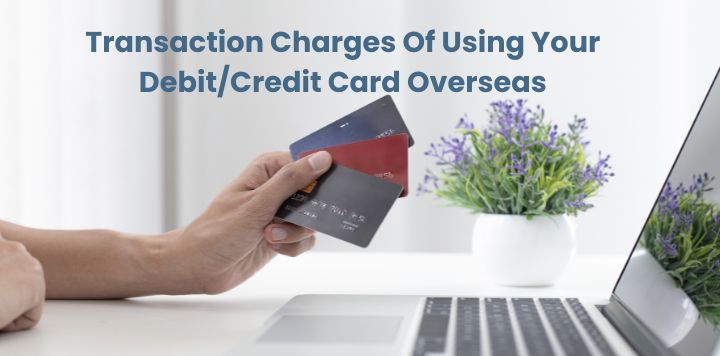Traveling abroad is indeed exciting, but it’s essential to understand the potential costs associated with using your debit or credit card overseas. Foreign transaction fees can add up, impacting your travel budget. Here’s what you need to know and how to minimize these charges.
Why Your Debit/Credit Card Isn’t as Cheap as It Seems Overseas
Many people mistakenly believe debit and credit cards are an economical, all-in-one solution for managing travel expenses, largely unaware of the hidden transaction charges. The promise of bonus points and rewards makes it seem like you’re saving big, but the reality is often the opposite. A lot of us don’t realize how much banks and card companies are charging us every time we swipe abroad.
When you use your debit or credit card overseas, the transaction involves multiple players—your bank, the merchant, and sometimes even third parties. Each of them takes their cut, and most of the time, you don’t even know it’s happening. Card issuers also add a “markup fee” for foreign transactions. And since they decide how much to charge, this can be ridiculously high, wiping out any rewards or points you thought you were earning.
On top of that, there are other extra charges for the services the bank provides. Understanding these charges can save you from unpleasant surprises.
Here’s What You’re Really Paying for: Major Debit/Credit Card Charges Explained
1. Foreign transaction Fee
This is the most common fee you’ll come across when using your card internationally. The foreign transaction fee is a surcharge for using your card outside your home country. Whether you’re shopping, dining at a restaurant, or paying for a service, your card issuer will charge a fee, typically ranging from 1% to 4% of the total transaction amount.
2. Currency Conversion Fee
Your card is based on your home currency (INR, for instance), but when you make a purchase abroad, the transaction needs to be converted into the local currency. Both Visa and Mastercard typically impose a currency conversion fee of up to 3.5% of the total amount converted. This fee is a standard charge for converting your funds into foreign currency.
3. Cash Advance Fee
When you withdraw cash from an ATM using your credit card, you’re subject to a cash advance fee. This fee applies regardless of whether you’re in India or abroad. In India, this is usually between 2.5% and 3%, but it can be higher for international withdrawals. Keep in mind, that cash advances often come with higher interest rates, and interest starts accumulating immediately.
4. ATM Withdrawal Fee
Most debit card issuers also charge an international ATM withdrawal fee, and it’s typically up to 4% of the amount you withdraw. Some ATMs may also charge a flat fee, such as $5, on top of this percentage, further increasing the cost of accessing cash. Be sure to check if your debit card issuer has any international ATM networks to reduce these fees.
5. Overlimit fee
If you exceed your credit card’s spending limit while abroad, you’ll incur an overlimit fee. This situation usually happens when unexpected expenses push you past your credit limit. Overlimit fees can be up to 2.5% of the amount you’ve spent beyond your credit limit. To avoid this, keep track of your spending to ensure you don’t surpass your available limit.
6. Dynamic Currency Conversion Fee
Dynamic Currency Conversion (DCC) is a service some merchants offer, where they allow you to pay in your home currency (like INR) instead of the local currency. While this may seem convenient, DCC often comes with unfavorable exchange rates and additional fees. The merchant may charge a service fee, making the conversion more expensive than it would be if you paid in the local currency.
Popular Debit Cards and their Charges:
| Card Provider | Foreign Transaction Fee | Cash Withdrawal Fee |
|---|---|---|
| SBI Card | 3% + GST | Rs. 100 + 3.5% of withdrawn amount + GST |
| Axis Bank Card | 3.5% + GST | 3.5% of the withdrawn amount + GST |
| HDFC Card | 3.5% + GST | Rs. 125 + GST |
| ICICI Card | 3.5% + GST | Rs. 125 + GST |
| HSBC Card | 2.75% + GST | Rs. 120 + GST |
| Citi Bank Card | 3.5% + GST | Rs. 125 + GST |
| Kotak Mahindra Card | 3.5% + GST | Rs. 150 |
Popular Credit Cards and their Charges:
| Card Provider | Foreign Transaction Fee | Cash Advance Fee |
|---|---|---|
| SBI Card | 3.5% + GST | 2.5% or Rs. 500 (whichever is higher) |
| Axis Bank Card | 3.5% + GST | 2.5% (Min: Rs. 500) |
| HDFC Card | 3.5% + GST | 2.5% (Min: Rs. 500) |
| ICICI Card | 3.5% + GST | 2.5% (Min: Rs. 250) |
| HSBC Card | 3.5% + GST | 2.5% (Min: Rs. 500) |
| Citi Bank Card | 3.5% + GST | 2.5% (Min: Rs. 500) |
| Kotak Mahindra Card | 3.5% + GST | Rs. 300 |
FAQs
Q1. How long does it take for a credit card transaction to get posted?
Many people assume that credit card transactions are posted the same day they are made. In reality, merchants send the transaction to the payment processor (Visa, Mastercard, etc.) within 1 to 3 business days, which is why overseas purchases don’t appear immediately on your credit card statement.
Q2. How is the currency conversion rate applied to credit card transactions?
Another widespread misconception is that the conversion rate prevailing on the day of making a credit card purchase is the same rate that is applied to the transactions when they are processed. Since credit card payments are posted to the card networks after 1 to 3 days, the currency conversion rate on the day of the transaction is not taken into consideration. Once the payment is posted and the card networks process the transaction, they consider the conversion rate of the preceding day to prepare the final bill.
Q3. Can debit cards be used for international transactions?
Debit cards can be broadly categorized into 2 categories – domestic and international. If you possess a debit card that supports international usage, you can use it for transactions overseas. Confirm with your bank in advance whether your debit card supports the currency of the country you are visiting.
Q4. How much is the international transaction fee?
The transaction fee for international purchases differs from one debit card to another. It also depends on the country where you swipe your debit/credit card. Generally, the international transaction fee is around 3%. Some percentage of this fee goes to the card issuer and some of it may go to the payment network processor.
Q5. Do Visa cards have foreign transaction fees?
Yes, all debit/credit cards, including Visa and Mastercard, incur foreign transaction fees on international purchases.
Q6. How do I ward off international transaction charges?
You can’t completely avoid foreign transaction fees when using debit/credit cards. The best way to ward off international transaction fees is to use a prepaid forex card such as BookMyForex multi-currency forex card to avoid these charges, potentially saving you up to 6.5% over traditional debit/credit cards.
Related Posts:
All You Need To Know About Using Your Debit/Credit Card In Foreign Countries
Forex Card Vs Cash Vs Debit Card-The Best Way to Carry Money Overseas





























Leave a Reply